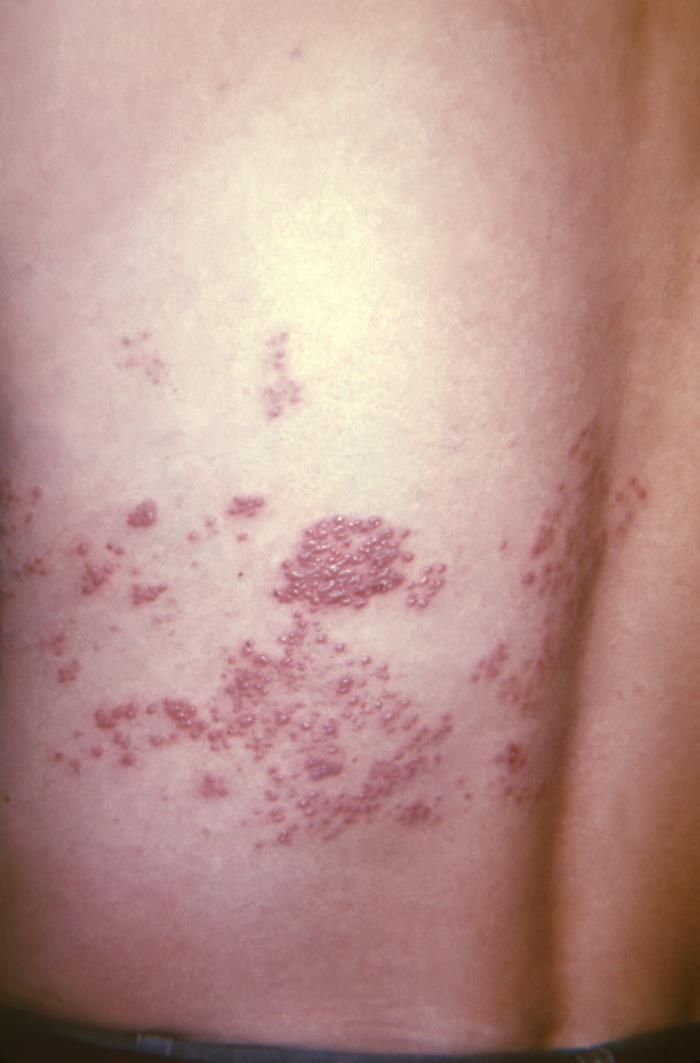Effective Shingles Prevention with the Shingrix vaccine
If you have shingles, or wish to be vaccinated to prevent it, we can help.
Shingles is a viral infection (called herpes zoster) that causes a painful rash and often leads to long-term, disabling complications. It is caused by the same virus (the varicella zoster virus) that causes chickenpox, and can affect anyone who has had chickenpox perhaps decades in the past. The UK population is largely unvaccinated against chickenpox: 95% of the population have had chickenpox, and are therefore at risk. The overall lifetime risk of getting shingles is one in four.
Shingles most often affects people over the age of 50 and the risk increases with age. It can affect younger people too, particularly women. Certain diseases that weaken your immune system (such as HIV and cancer), also increase your risk of shingles.
Some people get recurrent episodes of shingles which can be a painful nuisance.
Shingles is unpleasant: the rash can take up to 5 weeks to clear, and while it can usually be treated with medication, it can also result in more severe complications, such as vision loss or eye damage, and nerve damage resulting in excruciating neuralgic pain lasting several years.
Shingles is preventable.
We have been vaccinating against shingles since 2012, and recommending the recombinant Shingrix vaccine since it first became available in 2018. Shingles vaccination provides a high degree of protection and is an important step you can take to protect your health.
We recommend vaccination from age 50.
If you think you may have shingles or are worried about possible symptoms, prompt treatment (with anti-viral medication) is really important, so come and see us right away.
Other health benefits.
Protecting against shingles may hove other health benefits as well. Using the health records of more than 280,000 older adults in Wales, researchers found those who received the shingles vaccine were 20 per cent less likely to develop dementia over the next seven years than those who did not receive the vaccine.
Who should have the shingles vaccine?
Shingles vaccine is licensed for people aged 50 and over, and for any adult over 18 who is at increased risk.
As people get older, their immune system weakens, making it possible for dormant virus present in nerve cells to reactivate and cause infection.
The probability of getting shingles increases with age, which is why the vaccine is targeted at older age groups. It is also offered to people with medical conditions resulting in weakened immunity.
The vaccine is licensed from age 50, but only offered by the NHS to people aged 65, and those aged 70 to 79 years. If you are aged outside those years and would like to be protected, it is necessary for this to be done privately.
We recommend vaccination from age 50.
How many doses of the shingles vaccine are required?
For maximum protection two doses of the Shingrix vaccine are required.
The second vaccination should be administered two to six months after the initial vaccination. A completed course offers approximately 90% protection against shingles.
How do people get shingles?
Shingles is caused by reactivation of chickenpox virus, lying dormant in nerve cells.
During chickenpox infection, the varicella virus enters sensory nerve fibres, establishing a dormant infection in the body of the nerve cell. Reactivation occurs many years later, if immunity wanes.
You cannot catch shingles from a person who has shingles or chickenpox.
If a person who has shingles comes into close contact with someone who has never had chickenpox (or received chickenpox vaccine), they would be likely to catch chickenpox, not shingles. (They could then be at risk for shingles, years later.)
Why come to the Fleet Street Clinic for your Shingrix vaccine?
We have been administering Shingrix since it first came out in 2018.
Shingrix vaccine requires careful technique to avoid local side effects. We have long experience administering it safely. Experience counts!

Think you have shingles?
Prompt treatment can speed recovery and reduce long-term complications.
+ The first sign of shingles may be an area of burning, itching, tingling, or numbness.
+ A few days later, a rash appears - often in a band on one side of the body, or on the face, or around one eye
+ Soon afterwards, the rash turns into raised blisters that fill with fluid.
+ These become painful and sore. The blisters dry up and crust over.
+ The scabs fall off, but in 20% of cases the area is left with abnormal sensation.
+ The area becomes highly sensitive, and the lightest touch can be perceived as unbearable pain. This is called post-herpetic neuralgia and is one of the complications of shingles that vaccination, or prompt anti-viral treatment, can help avoid.
If you think you might have shingles, book a same day GP appointment:
We'll help confirm the diagnosis and provide anti-viral medication at the same visit.
What is shingles?
The most obvious sign of shingles is a painful, blistering rash, that usually follows a specific pattern.
Most people know very little about shingles, and only become aware of it when they or a close family member of friend become unwell with it.
Shingles occurs when chickenpox virus becomes reactivated, usually many years after childhood infection. As part of the initial chickenpox infection, virus enters sensory nerve fibres and travels to the body of the nerve cell where it can remain dormant for many years. Reactivation occurs when immunity wanes.
Shingles begins with abnormal sensation in the nerves affected by reactivation. There may be pain, itching burning or numbness. This is followed by a red or darkened rash, that then blisters and eventually crusts over. During the early phase of the illness, the person may also feel generally unwell, with fever, headache, chills and gastrointestinal symptoms.
The pattern is important: the rash is usually confined to the area of skin that is served by a single nerve. It therefore is usually present only on one side of the body, and in a characteristic pattern that doctors will recognise from their knowledge of anatomy, which helps confirm the diagnosis.
What are the long term effects of shingles?
The best-known complication is called post-herpetic neuralgia, resulting in severe, long-term pain.
Unfortunately, shingles selectively damages nerve fibres from the affected area of skin, that are involved in the perception of pain.
This can result in lasting abnormal sensation and intractable pain that can last months or years (post-herpetic neuralgia), causing severe disability.
Up to 20 per cent of people with shingles may experience this.
If the nerves to the front of the eye is affected (ophthalmic herpes), the consequences can include permanent eye damage.
How does the shingles vaccine work?
The Shingrix vaccine contains surface antigens of the varicella zoster virus, manufactured in cell culture using recombinant technology.
The vaccine is not live, and cannot cause shingles or chickenpox.
It contains viral proteins, plus an “adjuvant” – an additive designed to trigger an enhanced immune response. This enables the immune system to recognise and combat any reactivation of the virus.
FAQs
Unfortunately no vaccine offers 100% protection.
Those having the Shingrix vaccine develop approximately 90% protection against the shingles virus, making it unlikely to catch shingles following a complete 2-dose course.
Previously, the best option was the Zostavax vaccine which offered 51% protection. So Shingrix offers much greater protection.
Vaccination lessens the severity of infection, among those who do develop shingles despite vaccination.
As with most vaccinations a reaction at the site of injection such as pain, swelling and redness is the most common side effect but is short-lived. The vaccine contains an adjuvant – an additive designed to cause irritation and activation of the immune system: this provokes a more powerful resposnse in some people than in others.
There are fewer local side-effects when the vaccine is given by deep injection (one reason for picking your practitioner carefully).
Other common side effects can include fever, tiredness, headache and some digestive symptoms such as nausea, vomiting and diarrhoea. These reactions should last not longer than 2-3 days. You can seek advice from your doctor if they concern you.
The NHS has a shingles vaccination programme for those aged 65, and of those aged 70 to 79 years. In September 2023 the NHS began to offer Shingrix rather than Zostavax.
Outside these ages, it is necessary to obtain the vaccine privately if you wish to be protected.
We recommend vaccination from age 50.
Shingrix is licensed for adults aged over 50, and for adults over 18 with reduced immunity.
We recommend vaccination from age 50.
Zostavax and Shingrix are two different types of shingles vaccine.
Zostavax was the first vaccine to be produced against shingles. It is based on live chickenpox vaccine, at ten times the dose. Since it is a live vaccine, it is unsuitable for people with weakened immunity, and its real-world effectiveness proved to decline over time to approximately 50%. We offered it from 2012 to 2018.
Shingrix contains surface proteins produced using recombinant technology, combined with an adjuvant to enhance the immune response. It produces stronger and longer-lasting immunity and is now the shingles vaccine of first choice. We have been providing it since 2018.
Yes. Most people have only a single episode of shingles, but reactivation can occur, and some people are unfortunate enough to have recurrent episodes. Having shingles does not confer added immunity. and is not a reason to miss out on shingles vaccination.
If you have had chickenpox, it is likely you may have dormant varicella virus present in nerve cells, that may reactivate at some future point.
The lifetime risk of getting shingles is approximately one in four. The risk increases with age.
If you have never had chickenpox, you cannot get shingles.
We know that protection from Zostavax wanes over time, so if you have had Zostavax in the past and would like better protection, revaccination with Shingrix should be considered.
Previous vaccination with Zostavax does not mean that you cannot or should not have Shingrix.
We recommend waiting for six weeks after your rash has cleared before being vaccinated.





